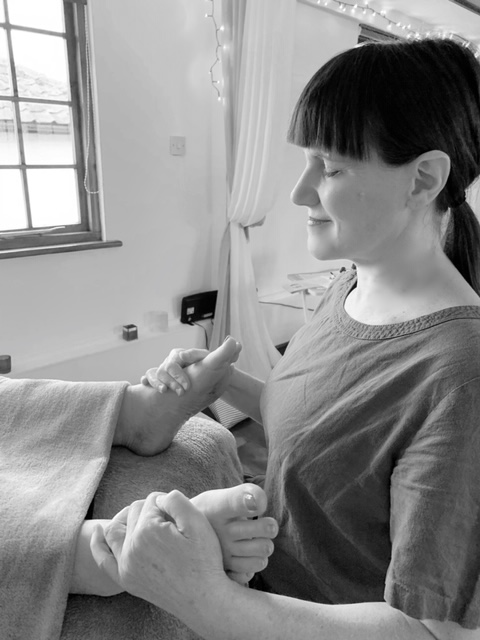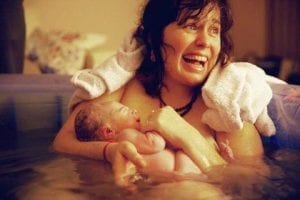Hot flushes, night sweats, sleep problems, mood swings, weight gain, reduced sex drive …. The symptoms of menopause and perimenopause go on and on!
Millions of women struggle with troublesome changes to their daily lives, often for many years. Symptoms often begin in your forties, and can last for anything from a couple of years up to fifteen years or more.
When I started studying Reflexology, I was curious to find out whether this holistic therapy really works for menopause symptoms. My experience and research have led me to the conclusion that it definitely does!
Physical and Emotional Changes
Menopause brings emotional changes as well as physical ones. Many women find themselves feeling low, irritable or anxious. Menopause is a time of transition into a new stage of life. Changes in the body are often accompanied by lifestyle changes, such as children leaving home, or changes to relationships. It can feel like a time of struggle and confusion.
Hormone Replacement Therapy
Doctors often prescribe hormone replacement therapy (HRT) to help manage menopause symptoms. While this can be very helpful and effective, many women either cannot or choose not to use HRT.
HRT can cause breast tenderness, vaginal bleeding and headaches. It is also associated with an increased risk of blood clots and breast cancer for some women (NHS Choices, 2018).
Alternative Therapies
It is not surprising that many women look for alternative ways to manage their menopause symptoms.
Relaxation and exercise therapies such as hypnotherapy and yoga can be very helpful. Holistic treatments can help reduce hot flushes and other menopausal symptoms. These include Traditional Chinese Medicine, Acupuncture, and Reflexology (Johnson, Roberts, & Elkins, 2019).
Reflexology reduces hot flushes and sleep disturbance, and improves quality of life
Reflexology is effective for reducing hot flushes, sweats and sleep disturbances. A Randomised Controlled Trial was carried out to test this in 2016. Women who had symptoms of menopause were given Reflexology treatments twice weekly for six weeks. These women reported far fewer hot flushes, sweats and night sweats (Gozuyesil & Baser, 2016).
Reflexology can also improve women’s quality of life. The women in the 2016 trial reported that they felt better in their social and sex lives, as well as sleeping better.
Another study in 2011 showed that menopausal women who were having difficulty sleeping slept much better after receiving Reflexology (Asltoghiri & Ghodsi, 2012).
Reflexology is safe and non-invasive
Reflexology in various forms has been used in many cultures for thousands of years to improve health and wellbeing (Hull, 2011). It is a safe and non-invasive therapy for many conditions.
We are still learning exactly how Reflexology works. The experience is deeply relaxing, and repeated treatments have a cumulative effect. Improvements in wellbeing and to specific conditions can be remarkable.
Relax and Sleep Better
It is wonderful to see my clients experiencing the same benefits.
I recently received feedback from a Reflexology client who had been suffering with badly interrupted sleep and night sweats. She was amazed and delighted to enjoy 5 to 6 hours of unbroken sleep – for the first time in many years – following her Reflexology treatments.
Feel more balanced and positive
As a woman in my fifties, I know how difficult and depressing it can be to live with symptoms of menopause. I am delighted to have discovered Reflexology.
This gentle and natural therapy can definitely help with those horrible hot flushes and broken nights. Treatments are also great for making you feel emotionally more balanced and positive.
Why not give it a try?
Karen Lawrence is a Reflexologist and Yoga Teacher living and working in Billericay, Essex. She specialises in treating women’s health issues, particularly symptoms of menopause.
You can learn more about Karen and book your Reflexology treatments at
Bibliography
Asltoghiri, M., & Ghodsi, Z. (2012). The effects of Reflexology on sleep disorder in menopausal women. Procedia – Social and Behavioural Sciences, 242-246.
Gozuyesil, E., & Baser, M. (2016). The effect of foot reflexology applied to women aged between 40 and 60 on vasomotor complaints and quality of life. Complementary Therapies in Clinical Practice, 78-85.
Hull, R. (2011). The Complete Guide to Reflexology. Cambridge: The Write Idea.
Johnson, A., Roberts, L., & Elkins, G. (2019, March 14). Complementary and Alternative Medicine for Menopause. Journal of Evidence-Based Integrative Medicine, 24.
NHS Choices. (2018). NHS – Menopause. Retrieved from NHS Choices: https://www.nhs.uk/conditions/menopause/treatment/





Very interesting Karen! It’s very heartening that more research is being carried out now.
Yes indeed! I see that my clients experience positive results, but it is reassuring to see this replicated in research studies too.
Thanks for this inspirational and very well written article.
Like!! Really appreciate you sharing this blog post.Really thank you! Keep writing.